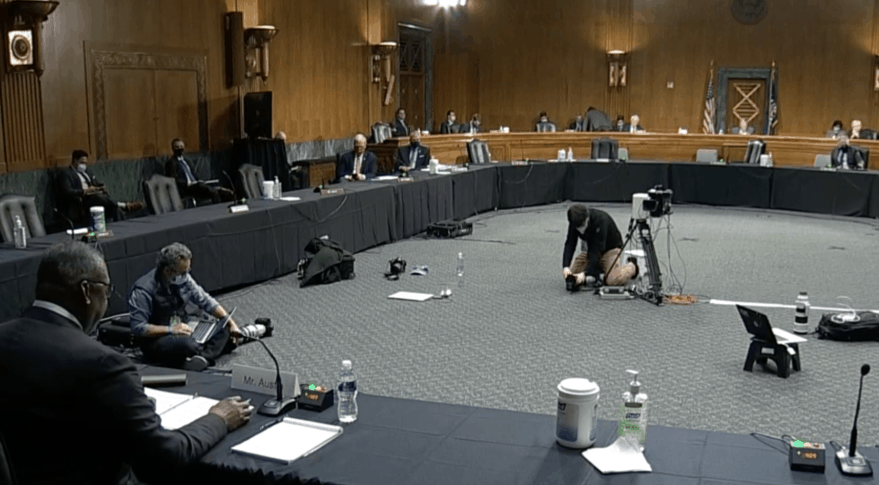Biden’s Defense nominee embraces view of space as a domain of war

President-elect Joe Biden’s pick for defense secretary Lloyd Austin told lawmakers Jan. 19 that China is the United States’ “most concerning competitor” and in written testimony identified space as a growing national security concern.
“If confirmed, I will ensure the space domain is carefully considered across the range of upcoming strategic reviews,” Austin said in a statement submitted to the Senate Armed Services Committee.
The SASC held a nearly four-hour confirmation hearing for Austin a day before Biden’s inauguration. He would be the nation’s first African-American secretary of defense. To get confirmed, Congress has to approve a waiver because Austin has not been retired from the military for seven years as the law requires. While some lawmakers said they oppose providing such a waiver, Austin is expected to be confirmed.
In prepared testimony, Austin called space “an arena of great power competition” and endorsed the prevailing thinking in the national security space community that U.S. systems have to be more resilient and survivable against anti-satellite weapons.
“Chinese and Russian space activities present serious and growing threats to U.S. national security interests,” Austin stated. “While Russia is a key adversary, China is the pacing threat.”
Austin did not weigh in on whether it was a good idea to establish the U.S. Space Force and U.S. Space Command — both strongly championed by the Trump administration. He said a military space reorganization had been advocated for years by independent commissions, lawmakers and multiple administrations.
“If confirmed, I will assess the current structure to ensure the defense space enterprise is postured to advance our national security objectives most effectively,” Austin testified.
He noted that the DoD space enterprise is “still not well integrated with other services and terrestrial commands, and there are several other challenges that will need to be addressed.”
More broadly, given the importance of space in as an engine of economic competitiveness, he said “it is essential to continue developing best practices, standards and international norms of behavior in space.”
Austin warned that commercial activities in space are a concern to the military because of the congestion and the possibility of collisions in orbit.
He noted that thousands of new satellites will be sent to orbit in the coming decade, most privately owned and operated. This creates a risk to the United States “in the sense that the government needs to ensure that they do not collide with expensive and exquisitely capable government assets.”
None of the senators during the hearing asked Austin any questions on space policy. Sen. Martin Heinrich (D-N.M.) brought up the recent decision by the Trump administration to move the headquarters of U.S. Space Command from Colorado to Alabama. Heinrich represents one of the locations — Kirtland Air Force Base — that competed to host Space Command.
Heinrich criticized the selection process and asked Austin to commit to “take a close look” at how the decision was made. Austin said he would do so.
Sen. Elizabeth Warren (D-Mass.) pressed Austin on his ties to defense contractor Raytheon, where he served on the board of directors. Austin said he will recuse himself from all Pentagon business involving Raytheon for the entire time he’s in office. “I’m sensitive to the appearance concerns you raise,” he told Warren.
Austin said the coronavirus pandemic currently is the nation’s greatest challenge and he would support a greater Defense Department role in the response to the crisis.
Austin’s hearing was the last one chaired by Sen. James Inhofe (R-Okla.) before control of the Senate shifts to Democrats. Sen. Jack Reed (D-R.I.) will chair the SASC in the new Congress.
“That transition will take place very peacefully,” Inhofe said to chuckles in the room.
Photo: The Senate Armed Services Committee held a confirmation hearing for Lloyd Austin Jan. 19, 2021. Austin is President Biden's nominee to be defense secretary. Credit: SASC
Link: Biden’s Defense nominee embraces view of space as a domain of war - SpaceNews











